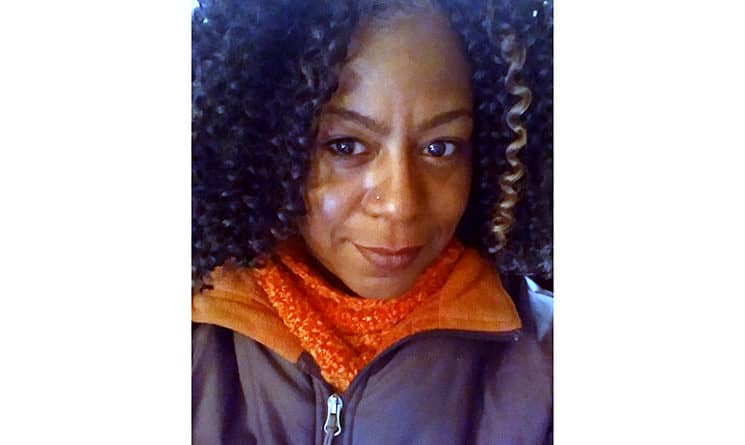Discover Portsmouth presents Shay Stewart-Bouley on being a “Black Girl in Maine”
By Chloe Kanner
On her blog, Shay Stewart-Bouley writes about marriage, parenting, working, aging, current events, and yoga, like many other writers. But, as a black woman in one of the nation’s whitest states, she has a very different perspective.
Stewart-Bouley moved from her hometown of Chicago to Saco, Maine, in 2002, so she could share custody of her son. The transition hasn’t been easy, and she has documented much of it in newspaper columns and on her blog, “Black Girl in Maine.”
She is now the executive director of Community Change Inc., a Boston-based civil rights organization, and is looking forward to moving closer to her workplace and returning to a more urban area.
The award-winning writer will talk about her personal experience and social service work at the Discover Portsmouth Center on Sunday, March 8. But first, she shared some thoughts with The Sound.
What was your first impression of Maine when you moved in 2002?
Maine was a shock to my system, since visiting a place and moving to it are two entirely different things. I knew that Maine was racially homogeneous, but it was a real jolt for me, and I was no stranger to spending time in white spaces. Maine in 2002 also felt incredibly provincial to me. It’s a place where family ties and traditions run deep and when you are from “away,” you don’t feel really welcomed, and that is compounded when one is “different.”
Since then, Maine has become slightly more diverse, but is still one of the whitest states. Have you noticed any difference?
Yes and no. Most of Maine’s newfound diversity is in Maine’s larger cities, such as Portland or Lewiston. I live in northern York County and, by and large, it’s still not a very diverse place. In 2002, I could go days without seeing another non-white person, and now I do occasionally see other non-white people, but it’s still a drop in the basket overall. The largest shift that I am seeing is that people are willing to talk about race in ways people were uncomfortable doing back in 2002. I would say that as America grows more diverse, Mainers are starting to notice that Maine is not part of that “browning,” and people are asking why.
Why aren’t more black people living in Maine?
The better question might be, “Why isn’t anyone really moving to Maine?” Maine has one of the oldest populations; our youngest and brightest often leave and the number of people coming into Maine just doesn’t balance out, and that’s without race being a factor.
As far as why more black people aren’t in Maine, it really boils down to things like economics and quality of life. Maine isn’t a prosperous state. Outside of the state’s natural beauty and assets, there really is very little (for) anyone, in my opinion, who doesn’t already have a connection. I think then when you add on things like the lack of a defined black community, it just isn’t an attractive place to many black people, aside from a visit. Many people mention the cold weather being a barrier, but as a Chicago native, I hardly think that the extreme winters are a barrier. After all, many black people during the Great Migration landed in places like Chicago, Detroit, and Cleveland — all places that experience weather similar to Maine.
How are race relations in Maine? Have you and your family experienced racism there?
In my experience, race relations are interesting. There are a lot of unintentionally racist people in Maine; people who don’t believe themselves to be racist, but engage in behaviors that are harmful for people of color. In some ways, this low-level but persistent racism tears at the soul far more than the blatant acts of racism.
My son, who is now 23 years old, had to unpack a lot of his Maine childhood and the constant slings and arrows of careless words that he dealt with. My youngest child is oblivious to much of it, but it doesn’t escape me that our family is one that is rarely invited to places. My experiences seem to mirror that of other people of color who I know in Maine. People are pleasant enough but hold us at arm’s length.
Yes, we have experienced a few direct acts of racism. They were really centered around my son’s teen years, when he grew into his full height of 6’4” and suddenly would encounter people who deemed him scary without provocation other than his physical presence.
Beyond that, what’s it like being a “Black Girl in Maine?”
It’s lonely and it’s painful. I have lived in a state where I have few friends, where despite my civic engagement over the years in Maine, I am an outsider. I honestly wouldn’t recommend it. I moved here due to a custody battle. My son is now an adult, but the economic downturn of 2007-08 hit us hard and put our plans to leave on hold.
How could Maine benefit from greater diversity?
Maine needs more people, period. Maine’s desire to be the way life should be, long-term, isn’t helping the state. Diversity is more than (having different races). It manifests in many ways and Maine needs all of it.
Are you still planning to move out of Maine?
Eventually. I work in Boston and more and more of my life is based in Boston, so a move is in the cards for me. However, I have a half-finished 130-year-old house, so I will still have some ties to Maine. Summers in Maine are perfect, so eventually I hope to be one of the summer folks.
Shay Stuart-Bouley will speak as part of the third annual Elinor Williams Hooker Winter Tea Talks on Sunday, March 8 at 2 p.m. at the Discover Portsmouth Center, 10 Middle St., Portsmouth. The event is presented by the Portsmouth Black Heritage Trail.

